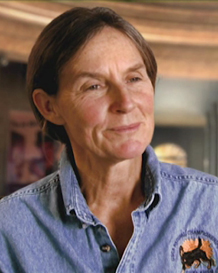
Rhonda Cornum
Brigadier General Rhonda Cornum, Ph.D, MD, served as a flight surgeon during the Persian Gulf War. While performing a search and rescue mission her Blackhawk helicopter was downed by enemy fire and Iraqi forces captured her.
QUESTION: Why did you join the military?
RHONDA CORNUM: Actually I joined the military to do research. I had my Ph.D. in
biochemistry, and I wanted to do research, and I had to do some non-profit thing and it was an
opportunity to live in San Francisco. That's why I joined.
QUESTION: When you joined, what was the general attitude to women serving in the military?
RHONDA CORNUM: Well, I would say that when I joined the attitude about women in my
particular specialties, which was medical research, was pretty accepting. I didn't feel
discriminated against, or singled out in any way.
QUESTION: Did it have a different set of standards because it was a medical profession?
RHONDA CORNUM: Well, being in the medical profession, in particular in a research institute,
and in a city where you don't do the typical military things people think about, we weren't in the
field, we weren't driving tanks, we weren't, you know, climbing the forty foot towers, we weren't
jumping out of airplanes. So, every year I would do something, some school, to remind myself I
was really in the Army. I did the expert field medical badge, and I did airborne school, and
things just to remind yourself that you really are in the Army. [LAUGHS]
QUESTION: What was your principal occupation?
RHONDA CORNUM: For most of my career I was a physician. I spent my first four years
doing research, but then I went to military medical school in Washington. The rest of the time a
physician, a flight surgeon, then to urology training, and a surgeon and then a commander.
QUESTION: What is the job of a combat flight surgeon?
RHONDA CORNUM: Well, a flight surgeon in general does primary care for primarily aircrew
and sometimes their families. When you're in combat you go with the unit and do the same
thing. It's an interesting thing as it turns out, primarily psychology and personal relationship
issues, because we're talking about a whole pile of really healthy well-screened young people.
QUESTION: Was that your personal occupation during the Persian Gulf War? RHONDA CORNUM: That certainly was. I went out as the flight surgeon for an attack helicopter battalion. I went out with all the maintenance people, and the pilots, and the administration and just took care of them. I had five medics. We took care of everybody that was in the unit and we also did whatever they needed us to do.


